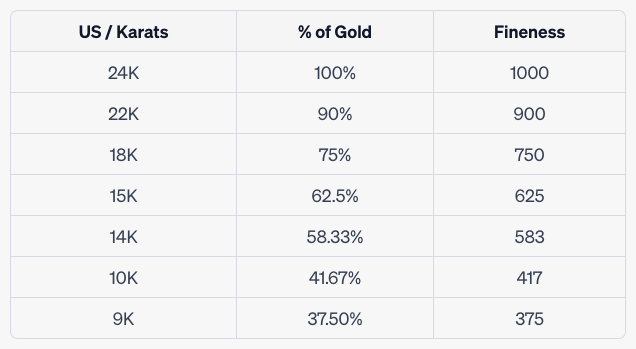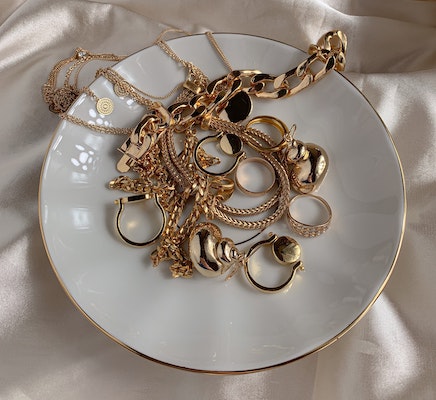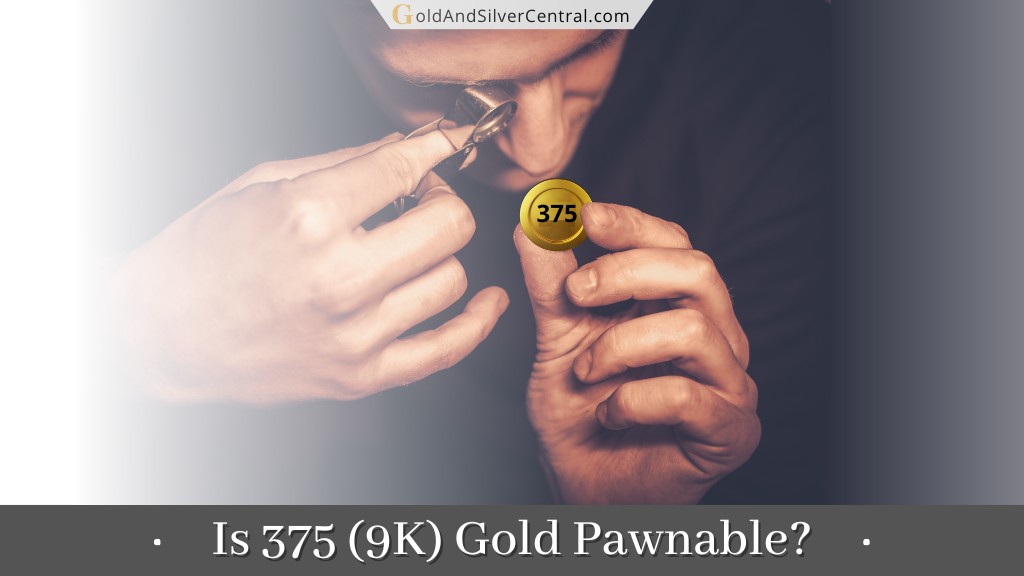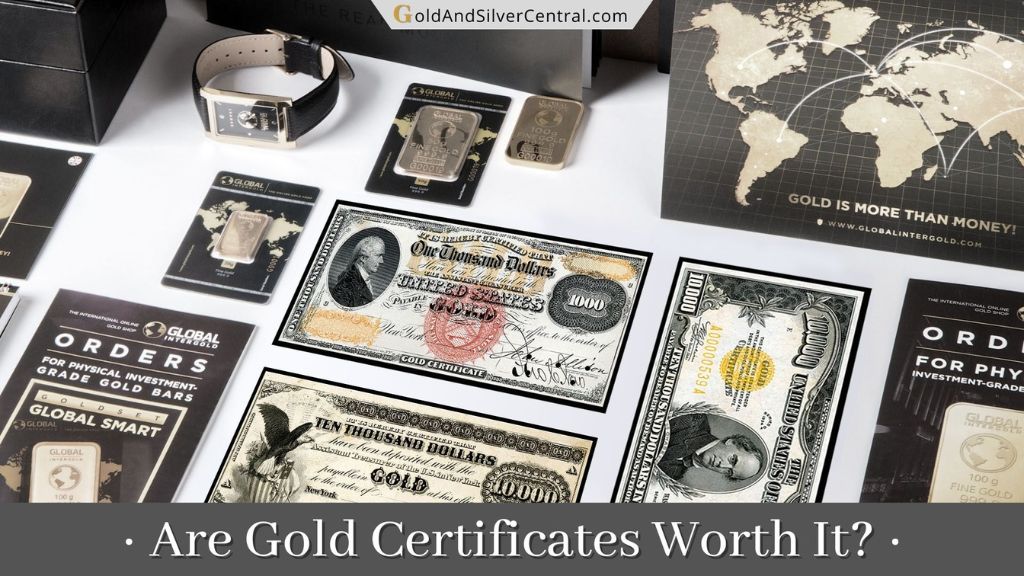You might be wondering:
- Can you pawn 375 gold or use it as collateral?
- Are there any pros and cons to doing that?
Now, diving into pawnshop world can feel a bit overwhelming.
There’s a lot to know about how they work, especially when it comes to something as precious as gold. But hey, that’s what we’re here for – to help you navigate it all.
Without further ado, let’s get started.
Investing in precious metals? Start profiting with our #1 gold newsletter today!
Characteristics of 375 Gold
First things first:
What does 375 on gold mean? What is 375 gold in karat?
The 375 gold is labeled as 9 karats and it means that it’s 37.5% pure gold, with the remaining 62.5% composed of alloy metals.
Because it’s so durable and affordable, this one has carved a niche for itself, particularly in the jewelry industry.

Jewelers often opt for this karat, combining the elegance with the practicality of added strength. From rings to bracelets, it offers a touch of luxury without breaking the bank.
(Of course, the yellow color/shade is more popular, as it’s more thought of ‘gold’.)
Now…
Will pawnshops accept the 375 gold?
They might, as it still holds value.
However, understanding its characteristics is important when talking about its pawnability.
The combination of purity and alloy content not only influences its visual appeal but also determines its market value.
So that’s what we’ll talk about in the next sections.
Factors Influencing Pawnability
Look:
Even though 375 gold is pawnable, not all pawnshops accept it right off the bat.
Some factors influence their acceptance, so be sure to familiarize yourself with them before you head down to the nearest store.
After all, you want to get the best deal out of your yellow metal.
Karat & Purity
Okay, so first up – karats.
Caratage is the measurement of purity of gold alloyed with other metals. The higher the karat, the more pure it is.

While 375 gold may not wear the crown of high purity, its 9 karats still make a substantial statement.
Pawnbrokers work out its value by weighing the metal’s karat alongside its alloy composition and will give you the price.
Current Market Value
We all know that the yellow precious metal dances to the tune of market whims.
Gold prices go up, gold prices go down.
Pawnshops keenly monitor its current market value, adjusting their assessments accordingly.
Keep in mind, they’ll give you less than the full market value – that’s the loan-to-value (LTV) ratio thing, which is like their safety net.
Pawnshop Policies and Regulations
Pawnshops, like any seasoned player in the financial game, operate within a set of rules and regulations.
Some places may specialize in higher purity gold, while others embrace the versatility of the market, including the lower purity 375 one.
Our best suggestion is to confirm the interest rates and the rules of several pawnshops in your area before finding the one that works for you.
Can You Pawn 375 Gold?
Now…
Can you pawn the 375 gold piece collecting dust in your jewelry box?

The answer is a “Yes,” but with a caveat.
The pawnability of this type of metal hinges on a delicate interplay of factors.
You see, pawnshops, in their essence, are in the business of providing short-term loans in exchange for collateral, and gold, regardless of its karat, is a sought-after commodity.
In the case of 375 gold, the key lies in managing expectations.
While not as pure as higher karat goods, this one brings its own set of advantages to the pawnshop table.
3 Factors Affecting Pawnability
- Durability and Alloy Composition
The 375 gold’s 9 karats contribute to its durability, making it less prone to wear and tear.
This can be an attractive feature for pawnshops, especially when dealing with jewelry items that have daily wear.
- Market Demand
The market’s appetite plays a great role.
Given its affordability and versatility in jewelry design, pawnshops catering to a diverse clientele may see the potential in 375 gold pieces.
- Pawnshop Expertise
The expertise of the pawnbroker cannot be overlooked.
A seasoned pawnbroker recognizes the nuances of appraisal, valuing the karat alongside market trends and the specific policies of their establishment.
In essence, you can pawn the 375 gold, provided you approach the pawnshop experience with a realistic understanding of its characteristics.
While you most likely will not fetch the same value as higher purity metal, the durability and unique aesthetic appeal of 375 gold can make it a viable candidate for pawning.
Pros and Cons of Pawning 375 Gold
Before you decide to pawn it, you need to know whether it would be a good idea to do so (or not!).

Here are its advantages and disadvantages:
Advantages:
- Affordability
An undeniable advantage is its cost-effectiveness. For those in need of quick cash without parting with high-value items, 375 gold presents a viable solution.
- Market Versatility
The diverse demand for 375 gold in jewelry makes it a versatile asset in the pawnshop market. Pawnbrokers catering to a broad clientele often appreciate its appeal and accessibility.
- You Still Own It
Think of pawning like letting a friend borrow your favorite jacket. You’re lending it out for a bit, but with the intention to get it back. Pay up the loan with its little extras (interest and fees), and your gold is right back with you.
Disadvantages:
- Lower Intrinsic Value
While affordability is a plus, 375 gold carries a lower intrinsic value compared to higher karat options. Therefore, the loan amount offered for pawning 9-karat pieces will likely be less substantial.
You’ll get paid more for pawning 585 gold (which holds more value because it’s almost 60% pure).
- Limited Market Demand
Although 375 gold’s versatility is advantageous, market demand may not be as robust as for higher purity metal. This can impact the resale value and, subsequently, the loan amount offered by pawnshops.
- Appraisal Challenges
Some pawnshops may specialize in higher purity gold, and their expertise in appraising 375 gold might vary.
So, finding a reputable pawnshop with experience in valuing and accepting this type of precious metal is important for a fair transaction.
Tips for Pawning 375 Gold
Now that you know the nuances, let’s equip you with some actionable suggestions to make sure you have a smooth and advantageous transaction.
- Stay Informed
Keep tabs on current market trends. Regularly check the prices to have a realistic expectation of the value of your 375 gold in the current economic climate.
This will also help you negotiate more confidently.
- Compare Offers
Don’t settle for the first offer that comes your way. Visit multiple pawnshops to compare their evaluations. This ensures you get the best deal for your goods.
- Read Reviews
Take the time to read reviews and testimonials about pawnshops in your area. A reputable establishment with positive customer feedback is more likely to offer fair deals.
- Ask Questions
Don’t hesitate to inquire about a pawnshop’s experience in handling 375 gold. Ask about their appraisal process and whether they have successfully dealt with similar items in the past.
- Be Patient
Negotiation is an art, and patience is key. Don’t be afraid to negotiate for a better offer. A little persistence can often lead to a more favorable deal.
Hopefully these tips help to navigate the pawnshop terrain with confidence.
Is 375 Gold Pawnable? (Verdict)
Look:
While you have other options like selling it outright or looking into jewelry loans, if you want to pawn your 375 gold, then you totally can.
The good news is the 9-karat pieces offer a unique combination of affordability, market versatility, and inherent durability, so pawnshops are generally open to it.
Pawning 375 gold is possible and it is a viable and pawnable option for individuals seeking temporary financial relief.
You could walk out with cash in hand, no pesky credit check needed.
Although do remember about the interest and the terms of repayment, and make sure to pay back, or else you lose your yellow precious metal for good.
On the bright side, pawning does come with some nice perks like getting cash on the spot and the chance to get your goods back once you settle the loan.
As always, remember to do your due diligence and trust your instincts.
After all, it’s your gold, and you want to make the best play possible.




